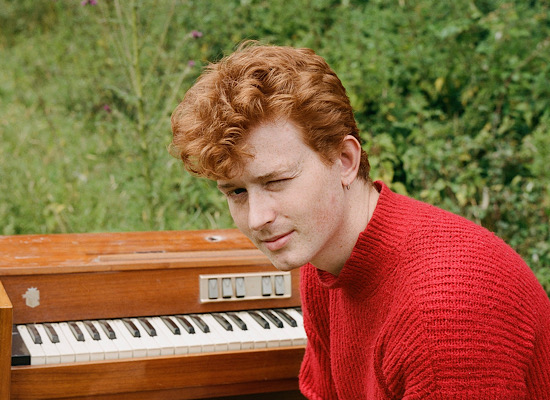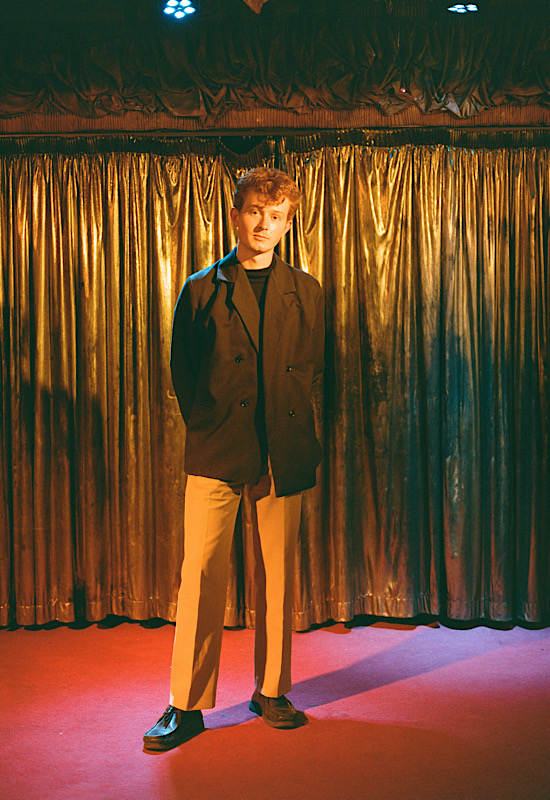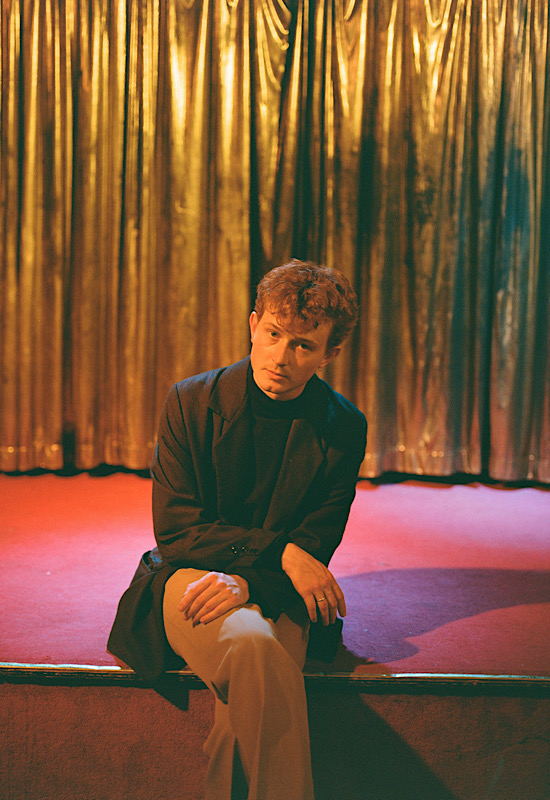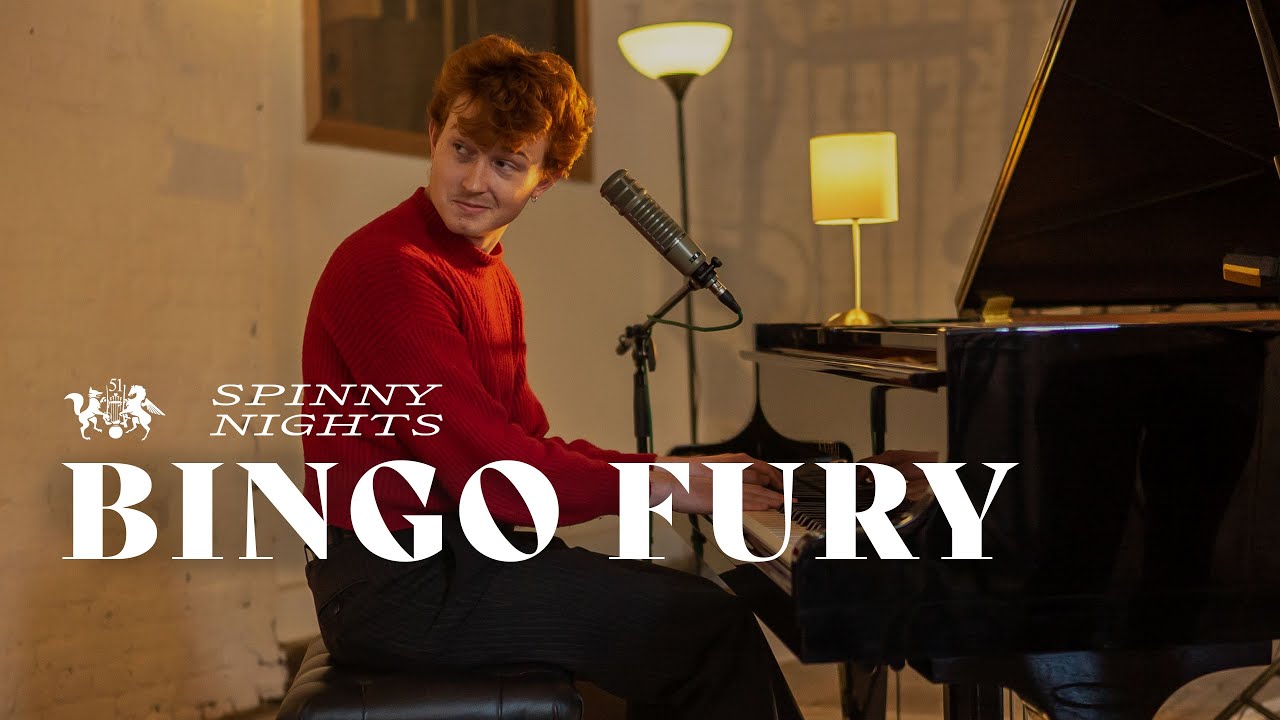Photos by Holly De Looze
“I listen to Neil Young through fucking YouTube, man,” says Bingo Fury in the downstairs room of a neon lit bar in Leeds. “It’s tragic. I’m walking down the street with my phone unlocked, hoping not to touch the screen by mistake, meaning I have to start the entirety of After The Gold Rush all over again. With adverts”. I have just asked for his take on Neil Young leaving Spotify, and if he too was ready to leave. By his looks of adoration – I think so.
The 23-year-old Bristol-based musician, real name Jack Ogborne, finds comfort in the uncomfortable. Atonality is the aim of his debut EP Mercy’s Cut, where his words flit between poeticism and melancholy, unhinged bass vocals. Watching him in the smoke-filled room of a warmly lit stage, accompanied by Rafi Cohen, the co-founder of Bristol club night and label Spinny Nights, and avant-jazz legend Harry ‘Iceman’ Furniss, reveals ways of playing instruments that I have never seen before. From Fury angling his guitar towards the ground, bouncing vibrations off the carpet, to drummer Henry Terrett using the snare drum as a sort of percussion-based synthesiser, originality does not go amiss in this rare, new wave ensemble.
The name ‘Bingo Fury’ appeared initially as a lyric, born in the notes section on a night out in Bristol under admirable circumstances. Fury wants to create music that shocks people to attention through notes that don’t quite sit right. This atonality forms the basis of his sound, creating a space where people can unwind; a story where no one knows which corner will be turned next.
He leans into his sturdy bass vocals well, especially in ‘Underfall Yard’, where his fierce words emulate that of a villain in a black and white film from the 50s. Fury endeavours to detach us from the busyness of technological life. Where most elements are difficult to follow, the unexpected makes it impossible not to engage and focus. For Fury, “that might be a note or a rhythm and this makes the whole image unsettling”. What’s reliable throughout his songs is a consistently captivating bass line from bassist, Megan Jenkins that is a mediator for an otherwise tumultuous tune.
When compared to his 2021 single ‘Happy Snake’, it’s clear to see the ways in which his music has become more polished. The sound, always in a middle ground between rawness and sophistication, is now delivered with increased vibrancy. Like an eccentric character from a well-loved, tea-stained novel, dressed in his red, woven jumper, Bingo Fury makes sense of life’s turbulence. He has an ability to transport you through not just music but ebbs and flows through layers and plots; all of which are bewildering, in the best kind of way.

If you were to speak to someone who had never heard of Bingo Fury before, how would you describe your sound?
Jack Ogborne, Bingo Fury: It happens a lot. It feels quite difficult to explain. My initial reaction is to compare myself to another artist. Yesterday, someone said that I sound quite like Captain Beefheart, another said The Lounge Lizards. I am finding a middle ground between Neil Young songs but arranging them like John Cage, providing emotion and consideration, shrouded in atonality and an unsettling arrangement.
Why do you choose to produce music that is atonal?
BF: I guess that there are certain rules that I apply to my work that are not always totally conscious. Generally speaking, a standard 4/4 rhythm doesn’t sit with me that well and our drummer Henry does a great job of working around that by playing less obvious stuff. I like the uncomfortable nature of it. Life is unsettling and raw in itself. I’m finding that middle ground so that people can relate to the discomfort but also find comfort at the same time. There is a reason why people might listen to punk when they’re angry or a ballad when they are sad, I’m just choosing a different emotion to tap into, in the hope that whatever shit someone might be dealing with, my music can see them through in some way.
When do you find yourself most creative?
BF: I have no routine, but neither does my life at the moment. During Covid I could arrange my life how I wanted. I would wake up in the morning and write at the piano for an hour then go out for a walk and think about what I had done, replay it, rework it, make it my own. More often than not, I can’t map out when I am going to be inspired. I often find influences from other people that I am listening to and then reinterpret it. A good way of starting writing is totally ripping something off and failing. Your own environment and limitations mean that you are naturally going to make something else, I find that is usually a pretty good place to start.
Do you find you are influenced by your environment?
BF: I’m from Bristol and as a city I really find it the backdrop to a lot of my songs. I particularly like walking at night, listening to music and taking in my environment which creates my creative head scape that usually acts its best between 10pm and 4am. I’m sentimental about Bristol and find seeing streets provide certain memories, and the interesting thing about living in a particular place for a long time is that you don’t just have one memory, you have multiple. They then kind of layer on top of each other and it becomes hard to remember which is which and what’s true and what’s not. This can be a good starting point to an idea or a feeling that might eventually become a song.

When did you start playing piano?
BF: I’m self-taught. When I was a student in Brighton, I lived next door to a piano shop, and I bought one on a month by month payment process. I taught myself at home at this was where a lot of Bingo Fury’s music was born. Because I had no idea how to play piano it was demanding all of my attention, making it a real mediative process for me. I don’t really know chords or scales, I just play what sounds right, or often wrong in Bingo Fury’s case.
Who are your influences?
JO: Tom Waits has had a huge impact on me. He was my first introduction to unsettling and atonal music. This really resonated with me as it’s like producing something more than a song, more like a film or an experience by giving someone a bit more. It’s a universally interesting element of all art to present something with a very familiar scenario and then changing it just slightly to make it feel off. That might be a note or a rhythm and this makes the whole image unsettling. I like that feeling.
Why do you want to make people feel unsettled?
BF: I like to be as direct as possible and emotionally connect with people as much as I can. Music that has really resonated with me in the past has been the dissonant or atonal. Listening to Glen Branca was great as a teenager as its uncomfortable nature reflected the discomfort you often feel at that age. The same goes for my music now because I like the idea of making people sit with uncomfortable feelings that they might not usually sit with. The other side of me really appreciates great writing like Neil Young. Finding a way in which these two things that really resonate with me is how I found Bingo Fury. I guess it’s like winning on the bingo or being in a furious argument, it’s that juxtaposition that I like to engage with.
Bingo Fury’s new EP Mercy’s Cut is out now via Practise Music



